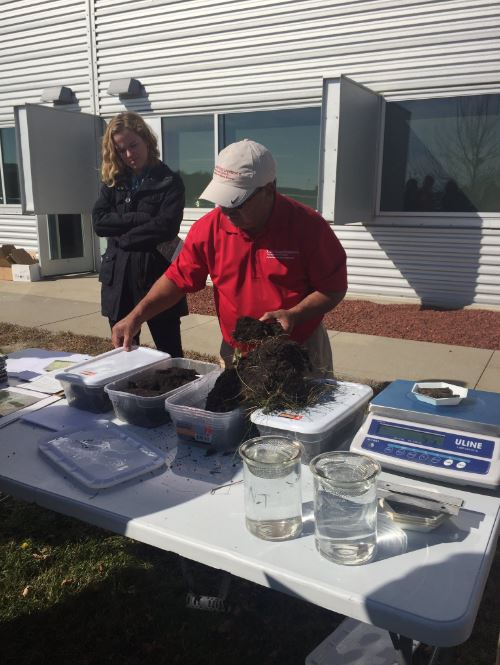Learning about the tools of the trade in conservation…

Written by Hanna Bates, Program Assistant at the Iowa Water Center
A few weeks ago, approximately 70 Iowa-based water professionals came together for the Watershed Academy. This two-day event was co-organized by Iowa State University Extension & Outreach, Conservation Districts of Iowa, the Soil and Water Conservation Society, Iowa Department of Agriculture and Land Stewardship, and the Natural Resources Conservation Service. The Academy sought to provide the latest information on conservation practices and educational resources.
At the Plate of the Union Water Quality Panel, I discussed our growing need for communicators to get information out to the public. The Watershed Academy is prime example for how we can get resources in the hands of those who can use them. The purpose of the Academy was to give watershed coordinators the materials to improve their outreach to the public. These are the kind of resources that enable people to see conservation in action and to get their hands a little dirty.
Providing opportunities for hands-on experiences allow an individual to try something new in an interactive way. It not only gives them a better understanding of a practice, but it also enables them to see how they could use it in their own lives. Organizations such as Iowa State University Extension & Outreach, Conservation Districts of Iowa, and commodity organizations, have user-friendly educational demonstrations and simple soil health evaluations that individuals can engage with. One tool is the Iowa Soil Health Assessment Card from Iowa State University Extension and Outreach. This is a scorecard that farmers can easily use to assess their soil conditions based on sensory cues, such as the visual appearance, texture, and smell of the soil (Fortunately, not taste!).
The Watershed Academy also featured conservation initiatives from the private sector. Bert Strayer, Western Cover Crop Lead for LaCrosse Seed, presented information on the company and how they discuss soil health with their customers. Their catalogs and informational materials not only describe their products, but also outline the importance of conservation. This is a cover crop supplier that not only provides a product, but also seeks to inform their customers about the importance of healthy soils.
Another presentation was by Erin Ogle, project coordinator for the Taylor County Water Quality Initiative project. This project is a unique example of how research and support from public entities can come together with the private sector to provide conservation services to farmers. Through a partnership with AgSolver, Iowa State University Extension and Outreach, Iowa Cattlemen’s Association, and others, farmers located in Taylor County can develop conservation plans for their fields that address both environmental and profit goals of the farmer. If you want to learn more about this project, Ogle will be giving a presentation at the 2017 Iowa Water Conference!
It was great to learn about all the different resources that are available to watershed coordinators and other water professionals in the state. Having educational tools can be instrumental in improving our water resources. That can especially be said for interactive demonstrations that get you a little dirty in the process!